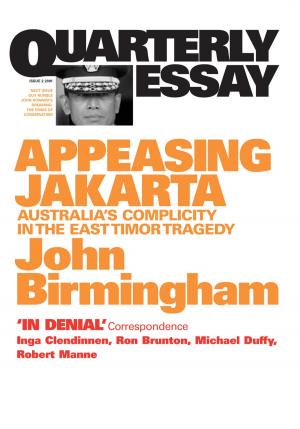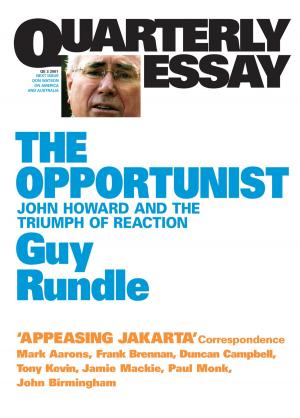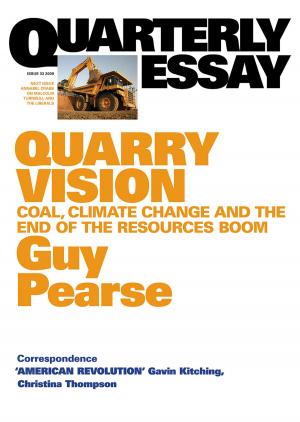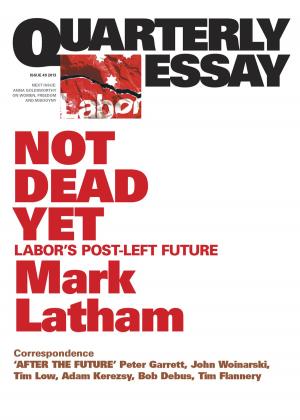Quarterly Essay 28 Exit Right
The Unravelling of John Howard
Nonfiction, Social & Cultural Studies, Political Science, International| Author: | Judith Brett | ISBN: | 9781921825279 |
| Publisher: | Black Inc. | Publication: | December 14, 2007 |
| Imprint: | Quarterly Essay | Language: | English |
| Author: | Judith Brett |
| ISBN: | 9781921825279 |
| Publisher: | Black Inc. |
| Publication: | December 14, 2007 |
| Imprint: | Quarterly Essay |
| Language: | English |
In Exit Right, Judith Brett explains why the tide turned on John Howard. This is an essay about leadership, in particular Howard's style of strong leadership which led him to dominate his party with such ultimately catastrophic results.
In this definitive account, Brett discusses how age became Howard's Achilles heel, how he lost the youth vote, how he lost Bennelong, and how he waited too long to call the election. She looks at the government's core failings - the policy vacuum, the blindness to climate change, the disastrous misjudgment of WorkChoices - and shows how Howard and his team came more and more to insulate themselves from reality.
With drama and insight, Judith Brett traces the key moments when John Howard stared defeat in the face, and explains why, after the Keating-Howard years, the ascendancy of Kevin Rudd marks a new phase in the nation's political life.
"It is when a leader's grip on political power starts to slip, when his threats and bribes miss their mark, when he starts to make uncharacteristic mistakes and when what had once been strengths reveal their limitations, that we can see most clearly the inner workings of that leadership. This essay is about John Howard's leadership, seen through the prism of its failings." —Judith Brett, Exit Right
In this definitive account, Brett discusses how age became Howard's Achilles heel, how he lost the youth vote, how he lost Bennelong, and how he waited too long to call the election. She looks at the government's core failings - the policy vacuum, the blindness to climate change, the disastrous misjudgment of WorkChoices - and shows how Howard and his team came more and more to insulate themselves from reality.
With drama and insight, Judith Brett traces the key moments when John Howard stared defeat in the face, and explains why, after the Keating-Howard years, the ascendancy of Kevin Rudd marks a new phase in the nation's political life.
"It is when a leader's grip on political power starts to slip, when his threats and bribes miss their mark, when he starts to make uncharacteristic mistakes and when what had once been strengths reveal their limitations, that we can see most clearly the inner workings of that leadership. This essay is about John Howard's leadership, seen through the prism of its failings." —Judith Brett, Exit Right
In Exit Right, Judith Brett explains why the tide turned on John Howard. This is an essay about leadership, in particular Howard's style of strong leadership which led him to dominate his party with such ultimately catastrophic results.
In this definitive account, Brett discusses how age became Howard's Achilles heel, how he lost the youth vote, how he lost Bennelong, and how he waited too long to call the election. She looks at the government's core failings - the policy vacuum, the blindness to climate change, the disastrous misjudgment of WorkChoices - and shows how Howard and his team came more and more to insulate themselves from reality.
With drama and insight, Judith Brett traces the key moments when John Howard stared defeat in the face, and explains why, after the Keating-Howard years, the ascendancy of Kevin Rudd marks a new phase in the nation's political life.
"It is when a leader's grip on political power starts to slip, when his threats and bribes miss their mark, when he starts to make uncharacteristic mistakes and when what had once been strengths reveal their limitations, that we can see most clearly the inner workings of that leadership. This essay is about John Howard's leadership, seen through the prism of its failings." —Judith Brett, Exit Right
In this definitive account, Brett discusses how age became Howard's Achilles heel, how he lost the youth vote, how he lost Bennelong, and how he waited too long to call the election. She looks at the government's core failings - the policy vacuum, the blindness to climate change, the disastrous misjudgment of WorkChoices - and shows how Howard and his team came more and more to insulate themselves from reality.
With drama and insight, Judith Brett traces the key moments when John Howard stared defeat in the face, and explains why, after the Keating-Howard years, the ascendancy of Kevin Rudd marks a new phase in the nation's political life.
"It is when a leader's grip on political power starts to slip, when his threats and bribes miss their mark, when he starts to make uncharacteristic mistakes and when what had once been strengths reveal their limitations, that we can see most clearly the inner workings of that leadership. This essay is about John Howard's leadership, seen through the prism of its failings." —Judith Brett, Exit Right















